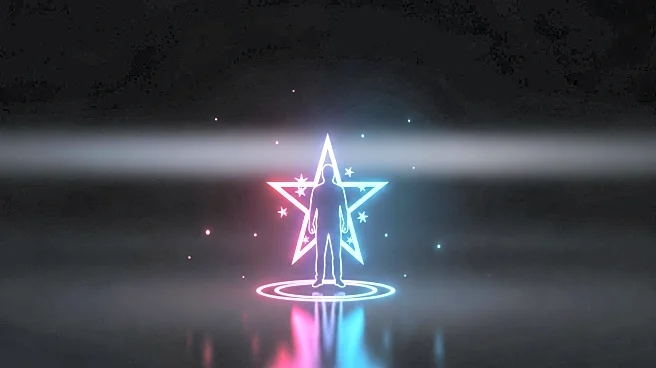What's Happening?
Tilly Norwood, an AI-generated figure created by the talent studio Xicoia, has become a controversial topic in Hollywood. Despite not being a real person, Norwood has been presented as a potential future star in the film industry, with comparisons to Scarlett Johansson. Her debut at the Zurich film festival has led to backlash from actors concerned about job security, as Norwood's existence challenges traditional roles in the industry. The AI-generated character has only appeared in a single comedy sketch, 'AI Commissioner,' which has received mixed reactions for its technical execution and humor. The debate centers around the implications of AI actors potentially replacing human talent, raising questions about creativity and employment in the entertainment sector.
Why It's Important?
The introduction of AI actors like Tilly Norwood represents a significant shift in the entertainment industry, potentially affecting thousands of jobs. Actors and other industry professionals express concern over AI's ability to replace human roles, which could lead to reduced opportunities and altered dynamics in filmmaking. The use of AI actors could lower production costs and eliminate issues related to human actors, such as salary demands and aging. However, it also poses ethical questions about creativity and the authenticity of performances. The broader impact could extend to how audiences perceive and value entertainment, influencing future industry standards and practices.
What's Next?
The future of AI actors in Hollywood will largely depend on audience reception and financial viability. If viewers embrace AI-generated performances, it could lead to widespread adoption in filmmaking. However, if the novelty wears off or fails to resonate, AI actors might not become a permanent fixture. Industry stakeholders, including directors and producers, will need to weigh the benefits of cost savings against potential backlash from traditional actors and audiences. The ongoing debate will likely influence future decisions on AI integration in entertainment, shaping the industry's evolution.
Beyond the Headlines
The rise of AI actors like Tilly Norwood highlights deeper ethical and cultural implications. It challenges the notion of creativity and artistic expression, as AI-generated performances lack the human touch that often resonates with audiences. The potential for AI to dominate the industry raises questions about the value of human talent and the authenticity of storytelling. Additionally, it prompts discussions on intellectual property rights and the use of AI in creating composite characters, which could lead to legal challenges. The long-term impact may redefine the relationship between technology and art, influencing cultural perceptions of entertainment.










